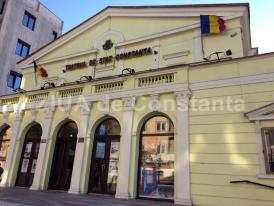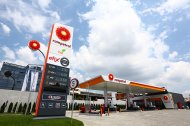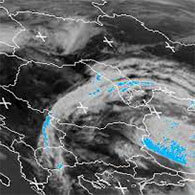Renewable M&As deals market rallies as confidence returns and prices of hydrocarbons soar
Renewable M&As: deals market rallies as confidence returns and prices of hydrocarbons soar 1571
Marime text
1571
Marime text
Strong growth in energy efficiency deals globally
US deal market bounces back to equal European transactions
Significant deals bring nuclear energy companies into renewables market
Regulatory uncertainty slows down deal activity in certain markets
Bucharest, 25 May 2011. North America's switch on to energy efficiency has driven their position in the global renewable M&A market in the last 12 months, and could act as a driver for the region to become the dominant renewables market within three years, according to new analysis by PwC.
PwC Renewables Deals, the annual sector analysis of M&A transactions globally, reports that globally the number of transactions in the sector were up, but overall values were down to US$33.4bn (2009: US$48.8bn). Across the world, market interest returned, with North America bouncing back to almost match deal values in Europe in 2010, with close to US$13bn spent on 181 deals.
"Strong confidence has come back to the market after financing issues caused the sector real problems in 2008 and 2009. In addition, in 2010 buyers and sellers expectations are more realistic, which has supported higher deal volumes. We expect confidence levels to remain relatively strong throughout 2011, despite regulatory uncertainty in some markets. In Romania as well, the volume of renewable energy transactions grew in 2010 and is likely to remain high in the next years as well if the legal framework for green energy is clarified and if the necessary improvements to the electricity grid are made", stated Alexandru Lupea, Partner, Assurance Services, Energy, Utilities and Mining Industry Group Leader, PwC Romania.
Globally, energy efficiency deals trebled in volume to represent over $3bn, or 11%of all renewable transaction value, overtaking last year's dominant market segment, Hydro power. However, wind and solar power continue to dominate global transactions in the sector. The US market dominated growth in the energy efficiency market in 2010 reflecting three factors: the potential for energy savings per capita, renewed regulatory interest (such as new US building codes aimed at delivering a 30% energy saving in new builds) and the increase in prices of conventional energy sources, in particular hydrocarbons.
"The growth in energy efficiency deals is not surprising, particularly in North America, because when you're trying to reduce emissions and cut costs, it's where the quick wins can be found. There's increasing consumer awareness around managing energy usage which, when supported with appropriate regulations, is creating an attractive market for energy efficiency service providers. This, combined with government stimulus packages, should see the US become a dominant player in the renewables deal market over the next few years. In our country, energy economy and efficiency will become very topical as the domestic price of gas will be equalized and heating subsidies reduced", added Lupea.
In other significant moves, market activity by US and French nuclear power generators and engineering firms into wind and solar sectors, are part of a wider move for the nuclear sector to extend its reach in renewables, further diversifying their production sources.
"Many of these moves by nuclear companies are driven by diversification. The reaction to the Japanese nuclear situation has been to take stock. While it won't raise a red flag to investment in nuclear, it could in the short term spur further moves by nuclear companies into renewables", said Lupea.
Despite increased transaction volumes, the ‘green premium' on renewables deals - the price investors were willing to pay for a business with products exposed to the renewables sector has narrowed, partially due to sellers' lowering their price expectations, and partially due to delays in the implementation of carbon-reduction regulations.
Power utilities purchases were down to a third of previous levels, in part due to regulatory reviews in Spain, Germany, Italy and the UK, but also as their focus has switched to delivering on massive capital investment challenges.
The largest deals were dominated by the flow of renewables flotations, including the $3.4bn spin off of Enel's green energy arm, and Chinese transactions, raising valuable capital for reinvestment in product and market development.
"The recent return to US$100+ priced oil and the reaction to the nuclear tragedy in Japan should provide some support to valuations and act as a timely reminder to governments that a shift to a low carbon economy is not only about its environmental commitment, but also about security of supply", concluded Lupea.
Notes
1. Renewables Deals includes analysis of all global renewable energy and clean technology M&A deal activity. This year, the analysis is based on transactions from Clean Energy pipeline's proprietary M&A database, provided by Venture Business Research. Figures relate to the actual stake purchased and are not grossed up to 100%. The analysis also includes deals with undisclosed value. Deals where the transaction value is undisclosed are assigned an average transaction value using a methodology derived from Clean Energy pipeline's proprietary M&A data.
2. Deal volumes and values:
- European deal volumes rose 50%, but overall values fell by over half to US$13bn
- North American deal volumes rose 71%, with deal values rising 43% to US$12.9bn
- South American deal
volumes rose 111%, with values more than doubling to US$3.3bn
- Asia Pacific (including Australasia) deal volumes almost doubled, but values fell by half to US$3.5bn
3. Nuclear investments in renewables: In the US, the $900m purchase of John Deere Renewables by nuclear power generator Exelon demonstrates the evolution of wind power and its integration into mainstream power generation. It's Execlon's first move into owning and operating wind project, and gives the company more options for future growth given the lack of momentum in US nuclear power development. The French nuclear engineering company Areva made its first move into the solar power market with a US$200m purchase of US company Ausra, a developer of solar thermal power technology.
About PwC:
PwC firms provide industry-focused assurance, tax and advisory services to enhance value for their clients. More than 161,000 people in 154 countries in firms across the PwC network share their thinking, experience and solutions to develop fresh perspectives and practical advice. See pwc.com for more information.
"PwC" is the brand under which member firms of PricewaterhouseCoopers International Limited (PwCIL) operate and provide services. Together, these firms form the PwC network. Each firm in the network is a separate legal entity and does not act as agent of PwCIL or any other member firm. PwCIL does not provide any services to clients. PwCIL is not responsible or liable for the acts or omissions of any of its member firms nor can it control the exercise of their professional judgment or bind them in any way.
© 2011 PricewaterhouseCoopers. All rights reserved.
Urmareste-ne pe Grupul de Whatsapp
 Fondul Documentar Dobrogea de ieri și de azi
Fondul Documentar Dobrogea de ieri și de azi















_thumb2.jpg)



















